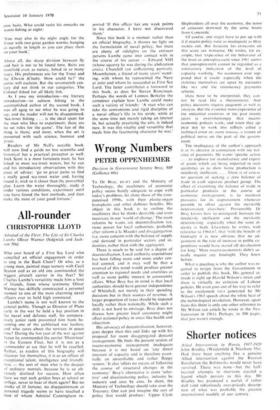All-rounder
CHRISTOPHER LLOYD
Admiral of the Fleet: The Life of Sir Charles Lanzhe Oliver Warner (Sidgwick and Jack- son 50s)
Who ever heard of a First Sea Lord who cancelled an official engagement in order to sing in the Bach Choir? Or who, as a young man, painted stage scenery with Cecil Beaton and as an old one commanded the biggest, aircraft carrier in the fleet? Sir Charles Lambe's versatility made him a host of friends, from whose testimony Oliver Warner has skilfully constructed a personal memoir to one of the most charming naval oflicers ever to hold high command.
Lambe's name is not well known to the general public. Though as Director of Plans early in the war he held a key position in the naval and defence staff, his compara- tively junior rank prevented him from be- coming one of the publicised war leaders; and who cares about the services in peace time? During the last year of the war against Japan he commanded the carrier 'Illustrious' in the Eastern Fleet, but it is not as a commander at sea that he will be recalled. Rather, as readers of this biography will discover for themselves, it is as an officer of exceptional talent, intelligence and friendli- ness — the sort of man who is the despair of ordinary mortals, because he is so ob- viously destined for success. How often have we met such golden boys at school or college, never to hear of them again? But no stroke of ill fortune, no disappointment or personal tragedy seems to have touched a man of whom Admiral Cunningham re-
ported 'If this officer has any weak points in his character, I have not discovered them.'
Since this book is a memoir rather than an official biography, it throws no light on the formulation of naval policy; but there are plenty of sidelights on the eminent persons Lambe came into contact with in the course of his career — Edward VIII (whose equerry he was during the abdication crisis). Churchill (an unflattering portrait), Mountbatten. a friend of many years' stand- ing, with whom he represented the Navy at polo and whom he succeeded as First Sea Lord. The latter contributes a foreword to this book, as does Sir Steven Runciman. Perhaps the words of Lennox Berkeley the composer explain how Lambe could make such a variety of friends: 'A man who can take the conventions and rigid discipline of a naval officer's life in his stride, while at the same time not merely taking an interest in, but actually practising the arts, is indeed rare. It was this vitality and versatility that made him the fascinating character he was.'


































 Previous page
Previous page